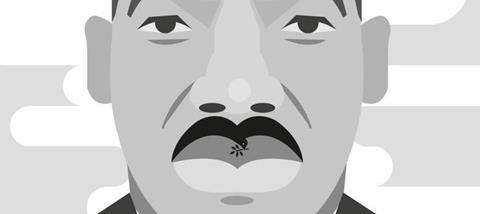
Rather than giving us a full Martin Luther King biopic, director Ava DuVernay and writer Paul Webb zoom in on the events in Selma, in 1965, which provided a case study on why change was needed, and proved a catalyst for that change.
By this point in the civil rights movement the Civil Rights Act of 1964 had been signed by President Lyndon B. Johnson. Despite this, in Alabama and many other southern states, black people still did not have equal footing. Central to this was the right to vote. While legally everyone (of the right age) now had the right to vote, limits put in place from state to state stopped many black people voting, and as such becoming sheriffs, judges and even serving on juries, allowing violence against black people from individuals and even the police to go unpunished. It was into this context that King and other leaders of the Southern Christian Leadership Conference (SCLC) descended on Selma to highlight this issue and force the government into change. Such was the opposition to black suffrage in Selma that two people (one of them a white preacher from Boston who had gone to Selma to join the campaign) were killed for their part in the peaceful protests.
This eventually led to the Voting Rights Act of 1965 and the famous Selma to Montgomery march (which is central to the film’s conclusion). These aren’t spoilers, this is The protesting legacy of MLK has been picked up by dissatisfied and ignored groups today. In a time of ‘Hands up, don’t shoot’ in Ferguson (following Michael Brown’s shooting by a policeman) and ‘I can’t breathe’ in New York (after Eric Garner’s death, partly caused by a choking by authorities), the film feels prescient. In the UK, the riots of 2011 may have ended in greed and capitalist misery, but they began with a genuine disenfranchisement with the way certain sections of society are treated by the UK’s justice system, following the shooting of Mark Duggan in Tottenham. The need to stand up against those in power remains as urgent as ever. So what can Selma tell us about protesting?
Godly people can cause change
Central to the civil rights movement was Christians, many of them church leaders. Not only were they followers of Jesus, but they were men and women of vision, people who could dream of a better tomorrow and articulate it in a way that inspired others. Central to this was prayer. King is often shown praying, and even stopped to kneel midway through one march, before turning around and stopping the protest.
Throughout the centuries Christians have been the driving force behind many social changes. As we look around a world full of injustice: where is God calling us next? What are the global issues God is calling his people to fight for?
Not a one-man-job
The name of the film, Selma, tells us something about the civil rights movement. This isn’t called King. As much as we remember King, and how he was central to much of what happened in this time, the film rightly focuses on the community around him, the individiuals, many lost to history, who made a difference. The film’s director Ava DuVernay told Rolling Stone: ‘This was as much the story about the band of brothers and sisters around him as it was King’s story. That’s how history is made, not by consensus, but by people freakin’ battling it out. That’s how change happens.’

God doesn’t call us to do it on our own. Nor does he call us to surround ourselves with ‘yes men’ who will do whatever we say. The community of Selma and King’s fellow leaders are shown as strong men and women who added to the cause through their individual passions and giftings. Who is God calling you to surround yourself with? Who needs to call you to account? And conversely, what passions of other people can you support?
The importance of the outsider
There’s a moment in Selma when the tide turns. After a previous attempt at marching had gone badly, leading to brutal beatings by the police, the pictures are transmitted around the country. Following that, hundreds of people from across the USA descend on Selma to support the community. It’s at this point that the momentum shifts and the President and local authorities are forced to change tack. It may have taken white faces in a sea of black ones, but those people who were prepared to stand up for other’s rights made the difference. (Obviously the work of Martin Luther King and other black leaders played a huge part in getting them there too; this isn’t a white rescue story.)
Sometimes it takes those with a voice, with power, to stand up for those without a voice, without power. For us, that might mean standing up for the rights of our young people in a society where they are often forgotten. Alternatively it might mean working with our young people, enabling them to stand up for those around the world who are struggling to get their voices heard.











































